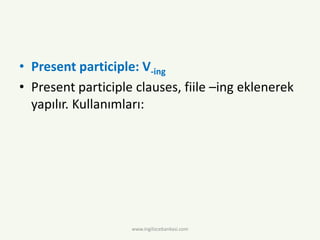Participle clauses
- 2. ŌĆó Present participle: V-ing ŌĆó Present participle clauses, fiile ŌĆōing eklenerek yap─▒l─▒r. Kullan─▒mlar─▒: www.ingilizcebankasi.com
- 3. ŌĆó ─░simlerin ├Čn├╝nde s─▒fat olarak kullan─▒labilir: www.ingilizcebankasi.com
- 4. ŌĆó Thinking man ŌĆó (d├╝┼¤├╝nen adam) www.ingilizcebankasi.com
- 5. ŌĆó Shouting man ŌĆó (ba─¤─▒ran adam) www.ingilizcebankasi.com
- 6. ŌĆó Crying baby ŌĆó (a─¤layan bebek) www.ingilizcebankasi.com
- 7. ŌĆó Flying vehicle ŌĆó (u├¦an ara├¦) www.ingilizcebankasi.com
- 8. ŌĆó Yan c├╝mledeki eylemle ana c├╝mledeki eylemin ayn─▒ zamanda oldu─¤unu g├Čstermek i├¦in kullan─▒labilir. www.ingilizcebankasi.com
- 9. ŌĆó Walking down the street, I fell into a hole. ŌĆó (Caddede giderken bir ├¦ukura d├╝┼¤t├╝m.) www.ingilizcebankasi.com
- 10. ŌĆó The man was flying on the plane listening to music. ŌĆó (Adam, m├╝zik dinleyerek u├¦akta u├¦uyordu) www.ingilizcebankasi.com
- 11. ŌĆó He fixed the tap singing a song. ŌĆó (┼×ark─▒ s├Čyleyerek muslu─¤u tamir etti) www.ingilizcebankasi.com
- 12. ŌĆó Bir eylemi, ilgili ba┼¤ka bir eylemin hemen takip etti─¤ini ifade ederken kullan─▒labilir. www.ingilizcebankasi.com
- 13. ŌĆó Going out of the cave, the man saw a dinosaur. ŌĆó (Ma─¤aradan ├¦─▒karak/├¦─▒k─▒p, adam bir dinazor g├Črd├╝) www.ingilizcebankasi.com
- 14. ŌĆó Taking out a book, he started to read. ŌĆó (Bir kitap ├¦─▒kar─▒p okumaya ba┼¤lad─▒) www.ingilizcebankasi.com
- 15. ŌĆó The man got a big tip, saying good bye. ŌĆó (Adam b├╝y├╝k bir bah┼¤i┼¤ al─▒p te┼¤ekk├╝r ederim dedi) www.ingilizcebankasi.com
- 16. ŌĆó Ana c├╝mledeki eylemin sebebini belirtebilirler. www.ingilizcebankasi.com
- 17. ŌĆó Not wanting to get fired, she worked hard. ŌĆó (Kovulmak istemedi─¤inden, s─▒k─▒ ├¦al─▒┼¤t─▒) www.ingilizcebankasi.com
- 18. ŌĆó Being sleepy, I drank coffee. ŌĆó (Uykulu oldu─¤umdan, kahve i├¦tim) www.ingilizcebankasi.com
- 19. ŌĆó Hearing the bad news, she felt very sad. ŌĆó (K├Čt├╝ haberi i┼¤itip, ├¦ok ├╝z├╝ld├╝) www.ingilizcebankasi.com
- 20. ŌĆó After, before, since, while, on zaman kelimelerinden sonra kullan─▒labilirler. www.ingilizcebankasi.com
- 21. ŌĆó After finishing his work, he left the office. ŌĆó (─░┼¤ini bitirdikten sonra ofisten ayr─▒ld─▒) www.ingilizcebankasi.com
- 22. ŌĆó He fell asleep while working hard. ŌĆó (S─▒k─▒ ├¦al─▒┼¤─▒rken uyuyakald─▒) www.ingilizcebankasi.com
- 23. ŌĆó Who/which + fiil ┼¤eklinde ba┼¤layan relative clauses yerine kullan─▒labilir. www.ingilizcebankasi.com
- 24. ŌĆó The man who is walking proudly is my boss. ŌĆó The man walking proudly is my boss. ŌĆó (gururla y├╝r├╝yen adam benim patronum) www.ingilizcebankasi.com
- 25. ŌĆó John is the person who feels stressed. ŌĆó John is the person feeling stressed. ŌĆó (John stresli olan ki┼¤idir) www.ingilizcebankasi.com
- 26. Perfect participles ŌĆó Yan c├╝mledeki eylemin ├Čnce oldu─¤unu vurgulamak i├¦in having + V3 yap─▒s─▒ kullanabiliriz. www.ingilizcebankasi.com
- 27. ŌĆó Having forgotten his screen at home, the man returned home. ŌĆó (Ekran─▒n─▒ evde unutarak /unutmu┼¤ oldu─¤undan, adam eve d├Čnd├╝) www.ingilizcebankasi.com
- 28. ŌĆó Having worked at the office for long, he knows here very well. ŌĆó (Ofiste uzun s├╝re ├¦al─▒┼¤m─▒┼¤ oldu─¤undan, buray─▒ iyi bilir) www.ingilizcebankasi.com
- 29. ŌĆó Having sung many songs, he went home. ŌĆó (Bir ├¦ok ┼¤ark─▒ s├Čyleyip, eve gitti) www.ingilizcebankasi.com
- 30. Past participle (V3) clauses ŌĆó Past participle clauses, fiillerin past participle yani V3 ┼¤ekliyle yap─▒l─▒r. www.ingilizcebankasi.com
- 31. ŌĆó Past participle, s─▒fat olarak kullan─▒labilir: www.ingilizcebankasi.com
- 32. ŌĆó Broken arm ŌĆó (k─▒r─▒k kol) www.ingilizcebankasi.com
- 33. ŌĆó Bandaged wrist ŌĆó (Bandajlanm─▒┼¤ bilek) www.ingilizcebankasi.com
- 34. ŌĆó Fallen leaves ŌĆó (d├╝┼¤m├╝┼¤ yapraklar) www.ingilizcebankasi.com
- 35. ŌĆó Past participle, ilgili olaylardan passive (edilgen) anlaml─▒ olan i├¦in kullan─▒labilir: www.ingilizcebankasi.com
- 36. ŌĆó Given his paycheck, the man jumped with joy. ŌĆó (├ćeki verildi─¤inden, adam sevin├¦le z─▒plad─▒) www.ingilizcebankasi.com
- 37. ŌĆó Robbed in the street, the man ran to the police station. ŌĆó (Caddede soyulup, polis istasyonuna ko┼¤tu) www.ingilizcebankasi.com
- 38. ŌĆó Adverbial c├╝mleciklerle (yani if, because, although, as, vb.den sonra ) kullan─▒labilir. www.ingilizcebankasi.com
- 39. ŌĆó Because given his paycheck, he was happy. ŌĆó (Maa┼¤ ├¦eki verildi─¤inden, o ├¦ok mutlu) www.ingilizcebankasi.com
- 40. ŌĆó Although invented short time ago, the smartphones are in everybodyŌĆÖs hand. ŌĆó (K─▒sa zaman ├Čnce icat edilmesine kar┼¤─▒n, ak─▒ll─▒ telefonlar herkesin elinde) www.ingilizcebankasi.com
- 41. ŌĆó After, before, when, since, while, on, by dan sonra being + past participle gelir. www.ingilizcebankasi.com
- 42. ŌĆó After being painted, the car looked nice. ŌĆó (Boyand─▒ktan sonra, araba ho┼¤ g├Čr├╝nd├╝) www.ingilizcebankasi.com
- 43. ŌĆó While being followed by the police, the man was walking as fast as he could. ŌĆó (Polis taraf─▒ndan takip edilirken, adam yapabilece─¤i kadar h─▒zl─▒ y├╝r├╝yordu) www.ingilizcebankasi.com
- 44. ŌĆó Passive (edilgen) yap─▒daki relative clauses yerine kullan─▒labilir. www.ingilizcebankasi.com
- 45. ŌĆó Car parts which are made in China are cheaper. ŌĆó Cars parts made in China are cheaper. ŌĆó (├ćinŌĆÖde yap─▒lan arabalar daha ucuz) www.ingilizcebankasi.com
- 46. ŌĆó The robbers, who are arrested by the police, are now in prison. ŌĆó The robbers, arrested by the police, are now in prison ŌĆó (Polis taraf─▒ndan tutuklanan soyguncular ┼¤imdi hapiste) www.ingilizcebankasi.com
- 47. thank y’üŖu ŌĆó prepared by ŌĆó H├£SEY─░N URAZ ŌĆó for ŌĆó www.ingilizcebankasi.com ŌĆó ┬® 2016 www.ingilizcebankasi.com















































